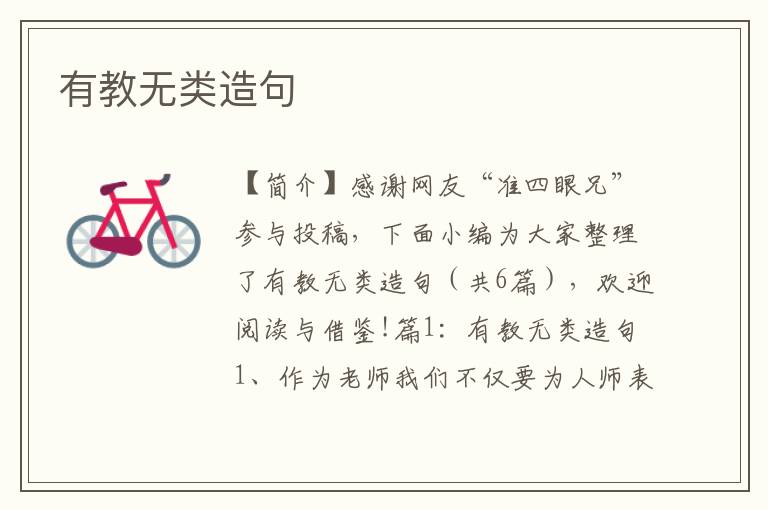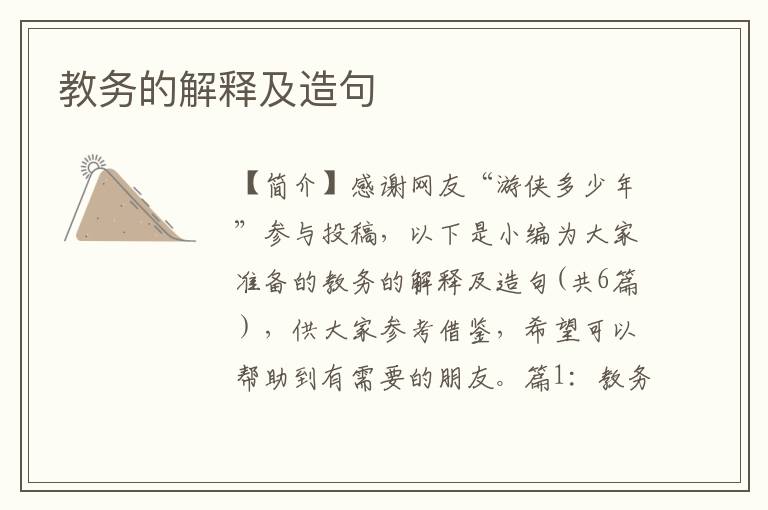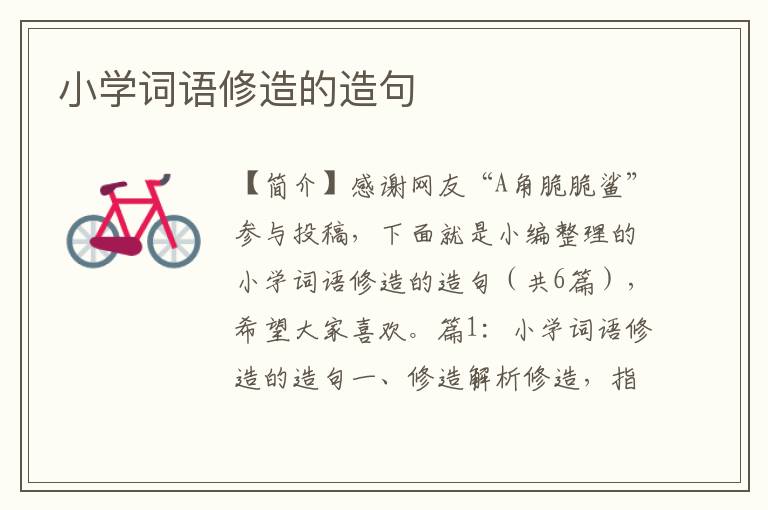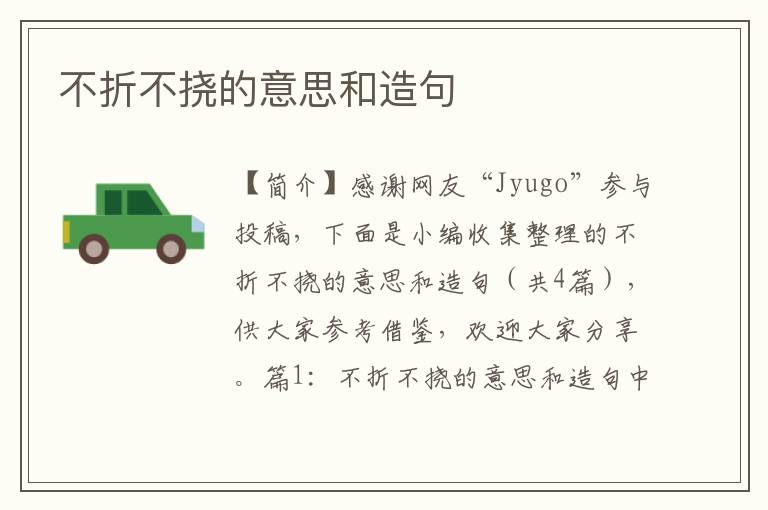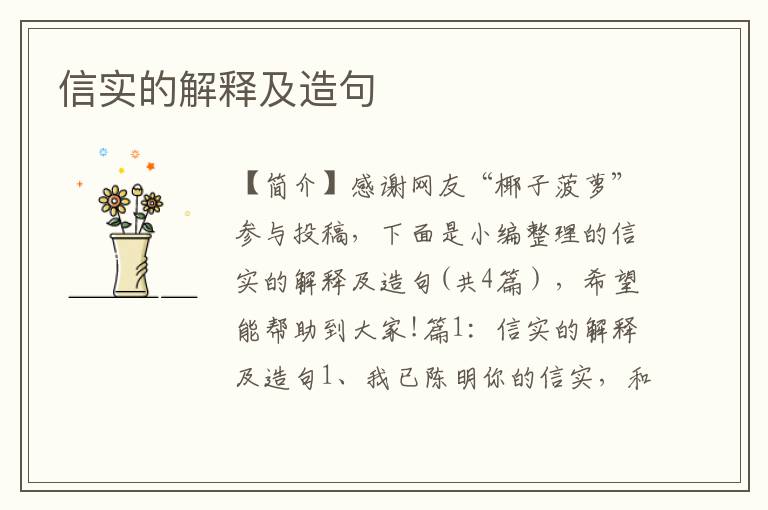反而造句

【简介】感谢网友“后知不觉”参与投稿,下面是小编帮大家整理的反而造句(共3篇),希望对大家的学习与工作有所帮助。
篇1:反而的解释及造句
1、反而,应该是具有意义的结果。
2、风不但没停,反而越刮越大了。
3、广州在南京的南面,反而没有南京热。
4、因此他们有可能要反而接受利润的减少。
5、如果上帝使我们的生活没有任何障碍,反而将会使我们会变得软弱,我们也不会变得像原本应该的那样坚强。
6、此例表明年长的人不仅没有被额外的信息绊倒,反而在吸收他们并对其加以处理。
7、而我想知道,洪水政治是否反而会使他们压抑和缄默,正如长久以来那样,使他们滑到最底层。
8、但是这让她感到如此的惊吓,没有看到她亲爱的小鹿,反而看到走进的这个高贵的绅士头戴着金王冠。
9、两者都是必需的,没有一者高于另一者;它们互不冲突反而互补,各自有其本身的职权范围。
10、我很努力地想要环保,但是却发现由于我的'无知,反而作出了愚蠢的决定。
11、他反而邀请我们到他家抽烟喝茶,于是我们就开到了他的村庄。
12、实际上,这么大笔的遗产对他不仅没有什么好处,反而会损害他的活力和对生活的激情。
13、因此我们也许能从日本那儿学到些什么,地震、海啸和辐射泄漏并没有引起社会的四分五裂,反而比以前更紧密地结合在一起。
14、他们节约能源,避免受到室外的寒冷,反而选择留在黑暗的住所内,里面包含的了许多的椿木和泥。
15、我认为人类是信息的消费者,不去吸收信息反而需要努力才能做到。
16、但我们不仅没有重新评价我们的对外政策,反而变本加厉。
17、她们不但得不到所渴望的自由和经济安全,反而成为人口贩子和惟利是图的雇主的剥削对象。
18、“站立”能锻炼背部,肩部和腿部的肌肉,而“坐”不但没有对身体提出积极的体力考验,反而强制它进入懈怠状态。
19、它们不再被最好的,最相关的和最有用的网站所占据了,反而是那些破解了秘密代码的商业公司们悄悄溜上了第一页。
20、当他非常开朗地得到一个接一个的社交互动帮助,他的老师没有惩罚他的不恰当的举止,反而理解有时这些举动是因孤独症而起。
21、计算机一点都不聪明,反而实在非常愚蠢,实际上,这才是它的非凡价值之一——它的盲目的愚蠢。
22、他们请求他告诉他们他发疯的真正原因,但是他非但没有告诉他们,反而还捉弄他们。
23、但是,回调当然也很有可能不在这里停下,反而继续下跌造成另一次强熊损失。
24、反而,她发现所有同一星系的星体似乎都是以近似于相同的速率作圆周运动。
25、反而,我被创造成独一无二的。
26、如果不消除了我们的经历,反而我们拥抱它,我们会发现,我们继续生存并进一步发展了我们的人文精神意识。
篇2:包含反而的词语造句
包含反而的词语造句
1. 夜晚有一种不一样的声音,似乎是微风与云的翻动,反而更衬出宁静的气息。
2. 他费了许多苦心反而弄得大家都讨厌他了。
3. 这个制假者不以为耻,反而还说假酒对人有益。
4. 临近考试,他不但不抓紧时间复习,反而玩得更加起劲。
5. 春分已经过了,天气不但没有转暖,反而更加冷了。
6. 他不但不反省自己反而变本加厉。
7. 宁宁体育课上不小心摔了一跤,他没有哭反而更认真地跟老师练习动作。
8. 由于太在乎,小明的这次考试成绩反而不太理想。
9. 小明由于平时勤奋学习,这次考试不但进步了,反而名列前茅!
10. 由于我对工作的不太了解,反而对团队产生了不好的`影响。
11. 一次打破了邻居家的窗户,可邻居并没责罚我,反而是为我敢于承认的做法给予了赞许。
12. 他不但不承认错误,反而无理狡辩,令人不爽。
13. 你这样做不仅没有帮到他,而且还拖累了他。
14. 他欺瞒老师试图掩盖错误,反而被同学拆穿。
15. 他想安慰她,却没想到反而使他更伤心。
16. 她不但没有帮上忙,反而变得碍事了。
17. 表演过火,效果反而不好。
18. 拥有了太多反而是负担。
19. 佐证多了,反而画蛇添足。
20. 不保护就是一种保护,过度保护反而是一种伤害。
21. 有时要的越多反而越难幸福。
22. 风不但没有减小,反而越刮越大了。
23. 从古到今,那些才能高的人反而难以受到重用。
24. 他挖空心思反而把事情全盘弄糟了。
25. 读书读得太多,反而会造成一些自以为是的无知之徒。
26. 他的病情未见好转,反而更恶化了。
27. 妈妈骂我,爸爸不但不劝,反而还火上浇油。
28. 他们这样原谅他反而使他如坐针毡。
29. 我帮了忙,出了力,反而不讨好,岂不是作茧自缚吗?
30. 他在这次竞赛中得了第一名,不但没有骄傲自满,反而更加用功了。
篇3:受伤后工作效率反而高了
按照常理来说,受伤了工作效率会降低,但是又一个神奇的理论却或受伤了工作效率反而高了,一起来看看吧。
Two weeks ago I was cycling home after visiting my 90-year-old father who had fallen over and broken a hip. It was a fine spring evening, my bike had just been tuned up and I was racing along feeling grateful not to be ancient, frail and immobilised.
前一阵子,我看望父亲后骑车回家。他已经90岁高龄,之前摔了一跤,摔断了盆骨。那是个春风和煦的美好夜晚,我的车子刚刚调好,我一路飞驰,庆幸自己依然年轻、身体强健、活动自如。
Halfway down Dalston Lane, the hipster cycling in front of me took a corner too fast, lost control of his bike and fell under my front wheel. I panicked, swerved and fell off myself.
当我在达尔斯顿路(Dalston Lane)上骑到一半时,骑在我前面的那位潮人拐弯太快,车子失去控制,摔倒在我的前轮下。我被吓了一跳,猛地转向,也摔下车来。
As I lay on the tarmac, I had a sense of déjà vu. The first thought that came into my head was: I’ve had a bike accident ― again.
我躺在柏油马路上,感觉有些似曾相识。出现在脑海中的第一个念头是:我又一次遭遇了自行车车祸。
Readers of this column might be getting a sense of déjà vu too. It’s not the first time they have had to read about me falling off my favourite means of transport. When I presented myself at work the next day a colleague took one look at my arm, hanging feebly in a sling, and said: “How annoying! You can’t even turn it into a column, as you’ve written that one already.”
这个专栏的读者或许也有似曾相识的感觉。这不是他们第一次读到关于我从我最喜欢的交通工具上摔下的文章了。第二天当我去上班时,一位同事看了一眼我打着吊带无力悬挂着的胳膊,说:“真讨厌!你都不能把这写成一篇专栏,你已经写过这类事了。”
At the time I agreed. But two weeks on, I’ve changed my mind. This time it’s different. My father’s broken hip and my own broken arm have taught me two lessons in how to get more done that are so profound, I have a duty to share them.
当时我对此没有异议。但是两周后,我改变了想法。这一次不一样。我父亲摔断的盆骨和我自己摔断的胳膊让我学到了两个关于如何能完成更多工作的深刻教训,我有责任分享出来。
When I came off my bike last year, I landed on my face, got a black eye, and grazes and bruises on forehead, cheek and chin. The subject of the column I wrote then was how to pretend to be a professional woman when you look like the victim of domestic abuse. That article now strikes me as being of niche interest ― although I did receive an email from a woman who had come off her bike, lost seven teeth and gone into the office the next day to chair a meeting.
去年当我从车上摔下时,我是脸着地,摔得眼眶乌青,前额、脸颊和下巴都有擦伤和淤血。我当时写的那篇专栏的主题是,当你看起来像家暴受害者一样时,该如何假装成职业女性。现在在我看来,那篇文章只会引起小众兴趣――尽管我的确收到了来自一名从自行车上摔下、磕掉了7颗牙的女性的邮件,事故第二天她就去上班主持会议了。
This time what I’ve learnt is of wider appeal. The two fractures establish two counterintuitive laws of productivity that can be used by anyone.
这一次我得到的教训能引起更广泛读者的兴趣。我从两次骨折事件中得到的两条违反直觉的工作效率法则,可以适用于任何人。
The first law I have invented myself and it goes like this: if you slow technology down, you go faster.
第一条法则是我自己发明的,它是这么说的:如果你把技术放慢,你会走得更快。
I have a small break at the top of my right arm, which means I can move my fingers and wrist, but the arm is strapped up so I can type only very slowly. Instead of being a disaster for someone who spends the whole day at the keyboard it has made me write more efficiently than I’ve done in years.
我右臂最上处有一处小骨折,这意味着我可以动手指和手腕,但是因为胳膊包扎起来了,所以我打字非常慢。对于整日与键盘为伍的人来说,这非但不是灾难,反而让我的写作效率达到多年来最高。
Because typing is hard, I am having to practise the long-forgotten skill of thinking before I write ― a requirement in the days of the manual typewriter, when the strictures of the Tipp-Ex bottle meant getting it right first time. Now, thanks to my computer’s infinite tolerance of mistakes, I think nothing of getting it wrong 20 times before finally getting a grip and writing something intelligible.
因为打字困难,我不得不练习起写作之前先思考这项遗忘已久的技能――在手动打字机时代(Tipp-Ex修正液的限制意味着要一次性写对),这是一项基本要求。如今,由于我的电脑对错误的无限容忍,在最终抓住核心、写下通顺的句子前,错上20次也没什么关系。
While my right hand is just about up to typing, operating a mouse is too much, and I’ve had to pass the job to my left hand ― which is entirely unequal to it. I now find that clicking on anything at all makes me feel like a contestant in The Golden Shot, the 1970s British television game in which a blindfolded cameraman holding a crossbow was guided by a contestant on where to aim it: up a little. Stop. Left a little. Stop. Up a little...Getting the dratted cursor in the right position is so arduous that multitasking has lost all appeal. There is no temptation to spend the day flitting from email to Twitter to eBay and back. I’ve had to pick a task and stick to it.
尽管我的右手刚好可以打字,但是确实没办法操作鼠标,于是我把这个任务交给了左手――而左手实在是没法和右手比。现在我发现,每次点击都让我感觉像是《The Golden Shot》(上世纪70年代的英国电视游戏,一名蒙着眼睛、拿着弩的摄像师在竞赛者的指引下瞄准目标)中的竞赛者:向上一点、停、向左一点、停、向上一点……把那可恶的光标移动到正确的位置实在太费劲了,以至于多重任务处理彻底失去了吸引力。我实在没兴趣耗费一整天的时间从邮件切换到Twitter、切换到eBay、再回到邮件。我只能选择一个任务然后坚持做完。
I have discovered these joys the hard way, but I don’t see why they couldn’t be enjoyed without falling off a bike. Anyone can operate the mouse on the wrong side ― although I should warn them that the learning curve is so steep that after a few days my left hand has started to get the hang of it, sending productivity tanking.
我用一种极不容易的方式发现了这些乐趣,但是我想不出为何不能在不摔下车的情况下享受这些乐趣。任何人都可以用不常用的手操作鼠标――不过我应该提醒他们,学习曲线非常陡峭以至于几天后我的左手才开始进入状态,工作效率惨不忍睹。
A more permanent solution is needed. Hardware manufacturers should set out to produce cumbersome technology for offices ― anti-ergonomic keyboards and mice that are as hard to control as supermarket trolleys ― making us masters of our computers once again, rather than vice versa.
我们需要一个更永久性的解决方案。硬件制造商应该着手为办公室开发难用的技术产品――像超市手推车一样难控制的反人体工程学键盘和鼠标――让我们再次成为电脑的主人,而不是被电脑牵着鼻子走。
The second counterintuitive law of productivity is not entirely my own invention. C Northcote Parkinson was the first to notice the indisputable truth that work expands to fill the time available. But in the past few days I have been shrinking time so drastically, often downing tools at 4pm to go to see my father, that I am starting to wonder if Parkinson went far enough. If you reduce your hours at work, not only do you achieve the same amount, you may achieve more.
第二条违反直觉的工作效率法则并不完全是我的发明。西里尔诺思科特帕金森(Cyril Northcote Parkinson)首先注意到了这个无可争议的事实:工作会扩张到占满所有可用时间。但是过去这些天,我大幅压缩工作时间,通常在下午4点前就停下工作去看望我父亲,于是我开始质疑帕金森的推断是否足够深入。如果你减少工作时长,你不仅能完成相同的工作量,或许还能完成更多工作。
What I can do when I’m on a roll for four hours is greater than what I can do in 10 when I’m not on one.
我全力以赴4个小时能完成的工作比我不在状态时10个小时完成的工作更多。
Again, you don’t need a father with a broken hip to be spurred into bouts of intense work. We just need something ― anything ― in our lives with a more urgent claim on our time than work to make us whip through the tasks in a jiffy.
再强调一次,你不需要父亲摔断盆骨才能刺激自己紧张工作。我们只需要生活中出现一些比工作更紧急的事――任何事――来让自己快马加鞭地完成工作。





